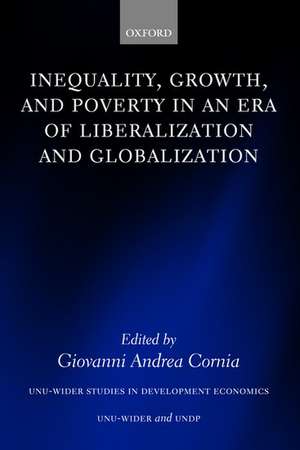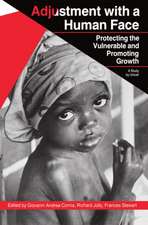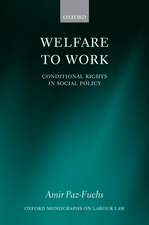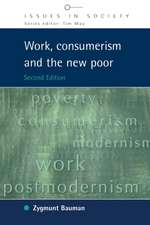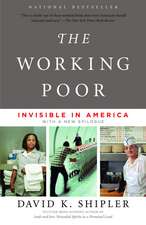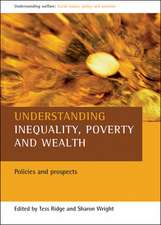Inequality, Growth, and Poverty in an Era of Liberalization and Globalization: WIDER Studies in Development Economics
Editat de Giovanni Andrea Corniaen Limba Engleză Hardback – 18 mar 2004
| Toate formatele și edițiile | Preț | Express |
|---|---|---|
| Paperback (1) | 747.92 lei 31-37 zile | |
| OUP OXFORD – 16 iun 2005 | 747.92 lei 31-37 zile | |
| Hardback (1) | 443.57 lei 31-37 zile | |
| OUP OXFORD – 18 mar 2004 | 443.57 lei 31-37 zile |
Din seria WIDER Studies in Development Economics
- 30%
 Preț: 504.34 lei
Preț: 504.34 lei - 30%
 Preț: 733.49 lei
Preț: 733.49 lei - 30%
 Preț: 597.88 lei
Preț: 597.88 lei - 17%
 Preț: 594.16 lei
Preț: 594.16 lei - 7%
 Preț: 159.68 lei
Preț: 159.68 lei - 13%
 Preț: 737.02 lei
Preț: 737.02 lei - 17%
 Preț: 583.39 lei
Preț: 583.39 lei - 28%
 Preț: 473.92 lei
Preț: 473.92 lei - 30%
 Preț: 501.49 lei
Preț: 501.49 lei - 30%
 Preț: 724.70 lei
Preț: 724.70 lei - 30%
 Preț: 748.64 lei
Preț: 748.64 lei - 31%
 Preț: 434.64 lei
Preț: 434.64 lei - 18%
 Preț: 333.97 lei
Preț: 333.97 lei - 34%
 Preț: 848.58 lei
Preț: 848.58 lei - 34%
 Preț: 847.76 lei
Preț: 847.76 lei - 34%
 Preț: 803.83 lei
Preț: 803.83 lei - 34%
 Preț: 953.65 lei
Preț: 953.65 lei - 34%
 Preț: 892.48 lei
Preț: 892.48 lei - 22%
 Preț: 188.78 lei
Preț: 188.78 lei - 30%
 Preț: 617.27 lei
Preț: 617.27 lei - 18%
 Preț: 334.18 lei
Preț: 334.18 lei - 27%
 Preț: 378.41 lei
Preț: 378.41 lei - 34%
 Preț: 1039.04 lei
Preț: 1039.04 lei - 34%
 Preț: 1043.37 lei
Preț: 1043.37 lei - 27%
 Preț: 329.58 lei
Preț: 329.58 lei - 34%
 Preț: 1292.22 lei
Preț: 1292.22 lei - 23%
 Preț: 1213.11 lei
Preț: 1213.11 lei - 34%
 Preț: 879.41 lei
Preț: 879.41 lei - 19%
 Preț: 652.21 lei
Preț: 652.21 lei - 34%
 Preț: 1039.15 lei
Preț: 1039.15 lei - 34%
 Preț: 892.84 lei
Preț: 892.84 lei - 22%
 Preț: 526.67 lei
Preț: 526.67 lei - 30%
 Preț: 913.24 lei
Preț: 913.24 lei - 34%
 Preț: 997.55 lei
Preț: 997.55 lei - 31%
 Preț: 396.19 lei
Preț: 396.19 lei - 17%
 Preț: 413.16 lei
Preț: 413.16 lei - 34%
 Preț: 1188.13 lei
Preț: 1188.13 lei - 34%
 Preț: 817.30 lei
Preț: 817.30 lei - 30%
 Preț: 1012.76 lei
Preț: 1012.76 lei - 7%
 Preț: 360.77 lei
Preț: 360.77 lei - 31%
 Preț: 447.33 lei
Preț: 447.33 lei - 27%
 Preț: 1295.53 lei
Preț: 1295.53 lei - 31%
 Preț: 441.13 lei
Preț: 441.13 lei
Preț: 443.57 lei
Preț vechi: 607.48 lei
-27% Nou
Puncte Express: 665
Preț estimativ în valută:
84.88€ • 88.84$ • 70.64£
84.88€ • 88.84$ • 70.64£
Carte tipărită la comandă
Livrare economică 19-25 martie
Preluare comenzi: 021 569.72.76
Specificații
ISBN-13: 9780199271412
ISBN-10: 0199271410
Pagini: 462
Ilustrații: numerous figures & tables
Dimensiuni: 163 x 242 x 30 mm
Greutate: 0.83 kg
Editura: OUP OXFORD
Colecția OUP Oxford
Seria WIDER Studies in Development Economics
Locul publicării:Oxford, United Kingdom
ISBN-10: 0199271410
Pagini: 462
Ilustrații: numerous figures & tables
Dimensiuni: 163 x 242 x 30 mm
Greutate: 0.83 kg
Editura: OUP OXFORD
Colecția OUP Oxford
Seria WIDER Studies in Development Economics
Locul publicării:Oxford, United Kingdom
Recenzii
... provides a systematic analysis of the changes in within-country income inequality over the last twenty years.
Notă biografică
Giovanni Andrea Cornia is currently professor of economics at the University of Florence. Before this, he was the Director of the World Institute for Development Economics Research (UNU/WIDER) in Helsinki (1995-2000), and Director of the Economic and Social Policy Research Programme at the International Child Development Centre (the world-wide research centre of UNICEF) in Florence (1989-95). He was also the Chief Economist at UNICEF Headquarters in New York (1981-89) and held research positions at UNCTAD, UNECE (with a long spell at ECLAC in Santiago) and the Economic Studies Centre of FIAT.
